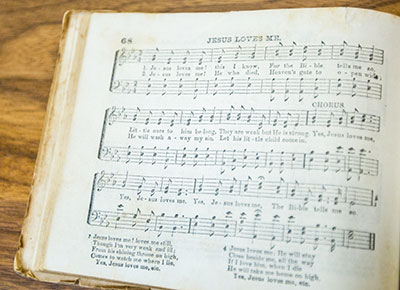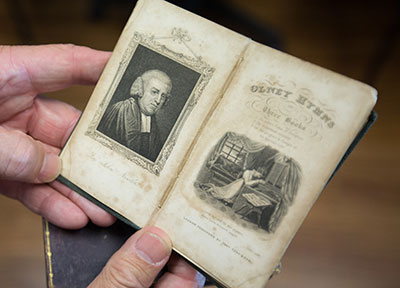Search News Archives
Filter News Articles
Additional Navigation
Library and School of Music acquire historic hymnal collection
July 1, 2016 : By Drew Menard - Office of Communications & Public Engagement

The words have faded on yellowing pages, stained with age and bound in covers frayed and worn. But the notes to “Amazing Grace,” “The Old Rugged Cross,” and “Jesus Loves Me” have stood the test of time, living on in hearts and on lips in churches and homes around the world.
This summer, Liberty University’s Jerry Falwell Library and School of Music acquired a special collection of nearly 2,000 hymnals, some dating as far back as the 18th century and worth hundreds to thousands of dollars. Included in the collection is an original John Newton Hymnal, one of the earliest to feature “Amazing Grace,” printed in England in 1779. There is also a first-edition “Golden Showers” by William Bradbury, which includes the first appearance of “Jesus Loves Me,” as well as an evangelistic rally hymnbook signed by Billy Sunday.
The collection was assembled over five decades by Jim Lutzweiler, a singer/songwriter and former archivist at Southeastern Theological Seminary who comes from a family of musicians. He was pleased to send his prized assembly to a place where it could continue to be cherished for years to come.
“Liberty’s purchase of these hymnals validated my long-term vision that the collecting of them and keeping them intact has been worth the effort,” Lutzweiler said. “They are rich with history, and they have profound lyrics that can continue to find their way into the hearts of worshipers and even create new worshipers.”
Most of the collection will be stored in the Archives and Special Collections Department of the Jerry Falwell Library while a display in the Center for Music and the Worship Arts will more prominently feature select books, with some rotating out of the archives to give students a chance to view pieces from several different periods of evangelical music history.

The School of Music will use the collection as primary resource material for those doing historical research in music education, worship studies, and hymnology.“This collection has provided us with original resources for historical studies and gives us an opportunity to study the culture of these different decades and generations,” said Dr. Vernon Whaley, dean of Liberty’s School of Music. “It helps us to document our story as evangelicals.”Hymns from each era — from the Great Awakening in 1700s England to the Sunday school movement of the early- to mid-1800s and the evangelistic crusades of the 1900s — tell a story about the church. Whaley said the music often reflects the theological emphasis of the day and the cultural issues of the time, such as abolition and prohibition.“The evangelical community as we know it today is relatively young,” he said, “and if you understand our history and why we have veered off to the right or the left over the years … most of the time it is because we have forgotten who we are and where we are going. (History) helps us keep perspective.”At the School of Music’s Center for Music & Worship, future worship leaders are trained to understand that each worship community has its own language and that understanding it is key to engaging a particular culture. Part of that understanding comes from knowing history, both of the local community and of the greater church.“We want this collection to be the start of a world-class archive at the School of Music as Liberty continues to strengthen its research culture,” Whaley said. “And we also hope that these beautiful pieces of history can be a reminder to students of our history and serve as an inspiration for our future as we train them as market-ready musicians and encourage student songwriters, artists, publishers, artist-managers, music educators, performers, film score specialists, and composers to saturate the industry and influence culture for God’s glory.”


